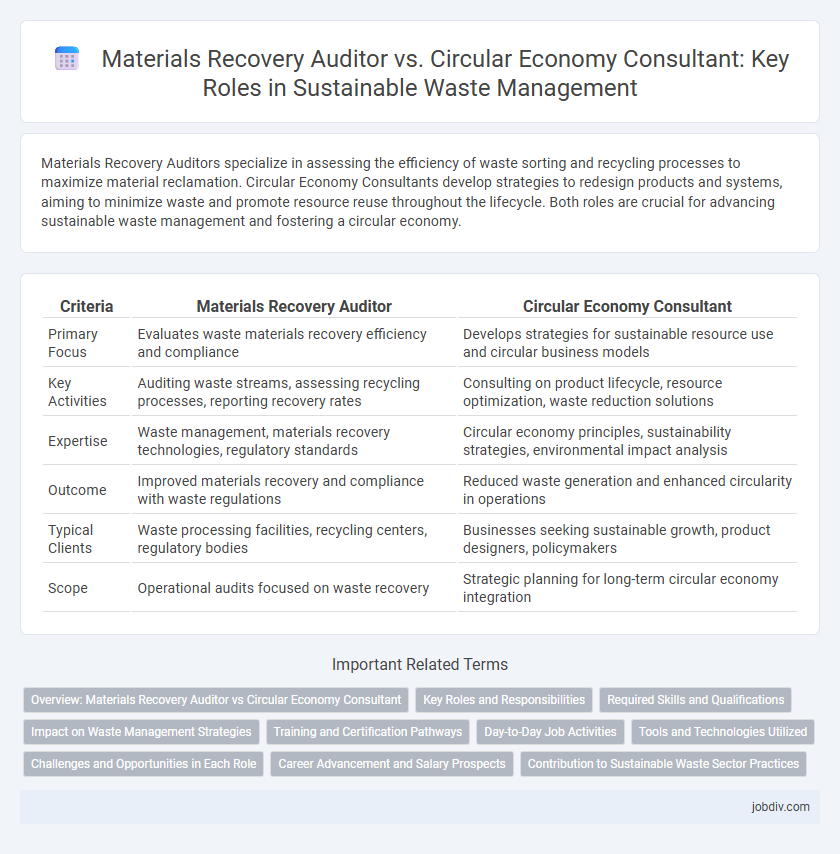Materials Recovery Auditors specialize in assessing the efficiency of waste sorting and recycling processes to maximize material reclamation. Circular Economy Consultants develop strategies to redesign products and systems, aiming to minimize waste and promote resource reuse throughout the lifecycle. Both roles are crucial for advancing sustainable waste management and fostering a circular economy.
Table of Comparison
| Criteria | Materials Recovery Auditor | Circular Economy Consultant |
|---|---|---|
| Primary Focus | Evaluates waste materials recovery efficiency and compliance | Develops strategies for sustainable resource use and circular business models |
| Key Activities | Auditing waste streams, assessing recycling processes, reporting recovery rates | Consulting on product lifecycle, resource optimization, waste reduction solutions |
| Expertise | Waste management, materials recovery technologies, regulatory standards | Circular economy principles, sustainability strategies, environmental impact analysis |
| Outcome | Improved materials recovery and compliance with waste regulations | Reduced waste generation and enhanced circularity in operations |
| Typical Clients | Waste processing facilities, recycling centers, regulatory bodies | Businesses seeking sustainable growth, product designers, policymakers |
| Scope | Operational audits focused on waste recovery | Strategic planning for long-term circular economy integration |
Overview: Materials Recovery Auditor vs Circular Economy Consultant
Materials Recovery Auditors specialize in evaluating waste streams to maximize material diversion and compliance with recycling standards, ensuring efficient recovery processes. Circular Economy Consultants focus on designing sustainable systems that minimize waste generation through resource optimization and closed-loop strategies. Both roles contribute to waste management but differ in scope, with auditors targeting material audit accuracy and consultants driving systemic circular solutions.
Key Roles and Responsibilities
Materials Recovery Auditors inspect waste streams to ensure proper sorting and compliance with recycling standards, optimizing the recovery of materials such as metals, plastics, and paper for reprocessing. Circular Economy Consultants design and implement strategies that promote sustainable resource use, emphasizing waste reduction, product lifecycle extension, and closed-loop systems to minimize environmental impact. Both roles collaborate to enhance waste management efficiency, with auditors providing data-driven insights and consultants crafting systemic solutions for circularity.
Required Skills and Qualifications
Materials Recovery Auditors require expertise in waste sorting technologies, regulatory compliance, and proficiency in data analysis to evaluate recycling efficiency. Circular Economy Consultants need advanced knowledge of sustainable business models, lifecycle assessment, and stakeholder engagement to design systems promoting resource circularity. Both roles demand strong problem-solving skills, but auditors emphasize compliance monitoring while consultants focus on strategic implementation of circular principles.
Impact on Waste Management Strategies
Materials Recovery Auditors critically evaluate waste sorting and recycling processes to enhance material recovery rates, directly reducing landfill contributions and increasing resource efficiency. Circular Economy Consultants design systemic strategies that prioritize waste minimization, product lifecycle extension, and resource regeneration, significantly transforming waste management frameworks toward sustainability. The combined impact of these roles drives improved waste diversion, cost reduction, and fosters a regenerative approach critical for resilient waste management systems.
Training and Certification Pathways
Materials Recovery Auditors typically pursue certifications like the Certified Recycling Specialist (CRS) or ISO 17025 training to ensure compliance with waste processing standards and quality control. Circular Economy Consultants often obtain credentials such as the Circular Economy Practitioner Certificate or LEED Accreditation, emphasizing sustainable design, resource efficiency, and systemic waste reduction strategies. Both roles require specialized training focused on regulatory frameworks, environmental impact assessment, and sustainable materials management to drive effective waste recovery and circularity initiatives.
Day-to-Day Job Activities
Materials Recovery Auditors conduct site inspections, verify waste segregation processes, and analyze recycling data to ensure compliance with environmental regulations and optimize material recovery rates. Circular Economy Consultants design sustainable resource management strategies, assess lifecycle impacts, and collaborate with stakeholders to implement closed-loop systems that minimize waste generation. Both roles prioritize reducing landfill dependence but focus respectively on operational verification and strategic circularity development within waste management frameworks.
Tools and Technologies Utilized
Materials Recovery Auditors utilize advanced sorting technologies, such as near-infrared spectroscopy and automated optical sorters, to accurately identify and separate recyclable materials, ensuring compliance and maximizing recovery rates. Circular Economy Consultants leverage lifecycle assessment software, data analytics platforms, and blockchain technology to design sustainable systems that promote resource efficiency and closed-loop supply chains. Both roles employ specialized digital tools to enhance waste management practices, but their focus diverges between operational recovery and strategic circularity implementation.
Challenges and Opportunities in Each Role
Materials Recovery Auditors face challenges in accurately assessing contamination levels and ensuring compliance with recycling standards, which directly impact the efficiency of waste processing facilities. Circular Economy Consultants encounter opportunities to design systemic practices that maximize resource reuse, though they must overcome barriers related to stakeholder engagement and the integration of sustainable supply chains. Both roles contribute crucial insights to waste management, with auditors focusing on operational accuracy and consultants driving strategic innovation toward sustainability.
Career Advancement and Salary Prospects
Materials Recovery Auditors specialize in evaluating waste sorting and recycling processes, often earning salaries ranging from $50,000 to $70,000 annually, with career advancement opportunities in environmental compliance and waste management firms. Circular Economy Consultants focus on designing sustainable business models and resource efficiency strategies, commanding higher salaries typically between $70,000 and $100,000, with prospects for leadership roles in sustainability departments and strategic planning. Both careers support waste reduction but differ in scope and salary growth, with Circular Economy Consultants generally achieving faster advancement and higher earning potential due to broader industry impact.
Contribution to Sustainable Waste Sector Practices
Materials Recovery Auditors play a critical role in optimizing waste sorting and recycling processes by verifying material recovery rates and ensuring compliance with environmental regulations, directly contributing to reduced landfill volumes. Circular Economy Consultants design and implement strategies that promote resource efficiency and closed-loop systems, transforming waste into valuable inputs for new production cycles to minimize environmental impact. Both roles drive sustainable waste sector practices by enhancing material reuse and supporting systemic changes towards zero waste goals.
Materials Recovery Auditor vs Circular Economy Consultant Infographic

 jobdiv.com
jobdiv.com